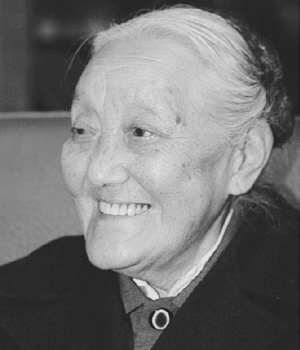From Chieftain to NPC Deputy
 |
| Yang Daidi (front, middle) attends the first National People’s Congress in 1954. [rmdbw.gov.cn] |
When the first National People’s Congress (NPC), China’s top legislative body, opened in 1954, there were 1,226 deputies, among whom were 18 women from China’s ethnic minority groups. Yang Daidi, the last chieftain of the Yi people who live in Leibo County, southwest China’s Sichuan Province, was one of those 18.
When she was born, the Yi chieftain system was collapsing but the ingrained tribal hierarchy and authority was still pervasive in all aspects of their life. When she was two, her father died, and her mother and aunt assumed the chieftain’s authority.
When she was graduated from high school, her aunt was so ill that she took over as chieftain. Thanks to her strong personality and wisdom, she was able to deal with all political factions.
“Yang was a great woman. Although she was short and young, she was quite majestic and respected,” recalled some elderly residents who experienced Yang’s rule.
When the People’s Republic of China was founded in 1949, it began formulating its election law. Based on the Common Program of the Chinese People’s Political Consultative Conference, a temporary constitution from 1949 to 1954, the law was completed and put into force in 1953.
Yang was elected as a deputy to the NPC and attended the its first meeting, in Beijing in September 1954, along with eight other deputies from the Yi ethnic minority group.
 |
| Yang Daidi in her twilight years [rmdbw.gov.cn] |
When she attended the Congress, she wore traditional Yi clothing and a hat decorated with precious gems. During a break between meetings, Chairman Mao (1893-1976) saw her in her gorgeous clothes and walked over to ask which ethnic group she belonged to.
During the meeting, Deng Xiaoping (1904-1997) introduced policies and methods of transforming the society of the Yi people into a democratic one. When he asked Yang’s opinion, she said she would give full support to the policies as they took good care of the interests of both the people of the upper and lower classes.
During the meeting, she was elected a member of the NPC’s Ethnic Affairs Committee.
At the second session of the first NPC in 1955, Yang, along with other Yi deputies, met with former Premier Zhou Enlai (1898-1976) and again said she would support democratic reform in the Yi area.
In September that year, the county level government was established in Leibo and Yang became its vice mayor. Later, she was elected vice chairperson of the military and political committee of Liangshan Yi Autonomous Prefecture, Sichuan Province.
In the following years, she served as member of the first Sichuan People’s Political Consultative Conference, and as an NPC deputy for three terms. She was also elected as member of the Presidium of the seventh and eighth NPCs.
This year there are more than 130 female deputies from China’s ethnic minority groups, who succeed Yang and the deputies of her generation in representing their people to the national Congress.
(Source: rmdbw.gov.cn/Translated and edited by womenofchina.cn)
Please understand that womenofchina.cn,a non-profit, information-communication website, cannot reach every writer before using articles and images. For copyright issues, please contact us by emailing: website@womenofchina.cn. The articles published and opinions expressed on this website represent the opinions of writers and are not necessarily shared by womenofchina.cn.

 京公网安备 11010102004314号
京公网安备 11010102004314号